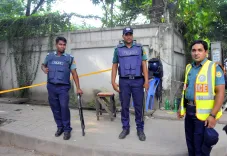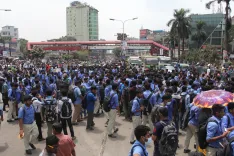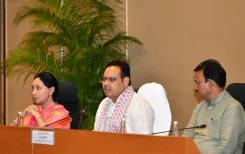Has the Number of Severely Malnourished Children Doubled in North Darfur?

Synopsis
Key Takeaways
- Severe acute malnutrition (SAM) cases in North Darfur have doubled amidst ongoing conflict.
- Over 40,000 children received treatment for SAM in early 2025.
- Nine localities in North Darfur surpassed emergency malnutrition levels.
- The situation is deteriorating in other regions, including North Kordofan and Gezira State.
- Urgent humanitarian aid is needed as the risk of mass child mortality rises.
Khartoum, July 11 (NationPress) The United Nations Children’s Fund (UNICEF) announced on Friday that the population of children experiencing severe acute malnutrition (SAM) in Sudan’s North Darfur region has doubled due to the ongoing military conflict in the country.
According to a statement from UNICEF, there has been a 46% increase in the number of children receiving treatment for SAM throughout Sudan’s five Darfur states between January and May 2025 compared to the same duration in 2024, as reported by Xinhua news agency.
“In North Darfur alone, over 40,000 children were admitted for SAM treatment in the initial five months of the year — double the figure for the same timeframe last year,” the statement revealed.
“In nine out of 13 localities, the acute malnutrition rate has exceeded emergency thresholds set by the World Health Organization,” it further noted.
Sheldon Yett, UNICEF’s representative for Sudan, stated, “Children in Darfur are being starved by conflict and are cut off from the very aid that could save their lives.”
UNICEF also indicated that the situation is similarly dire in other regions, with SAM admissions rising by over 70% in North Kordofan, 174% in Khartoum State, and 683% in Gezira State.
With Sudan currently experiencing the peak of the lean season, UNICEF warned of a rapidly increasing risk of mass child mortality in areas already close to famine thresholds. The crisis is further aggravated by outbreaks of cholera, rising measles cases, and deteriorating health services.
Sudan has been embroiled in civil conflict since April 2023, leading to the deaths of tens of thousands and the displacement of millions, both internally and across borders, exacerbating the humanitarian situation.









